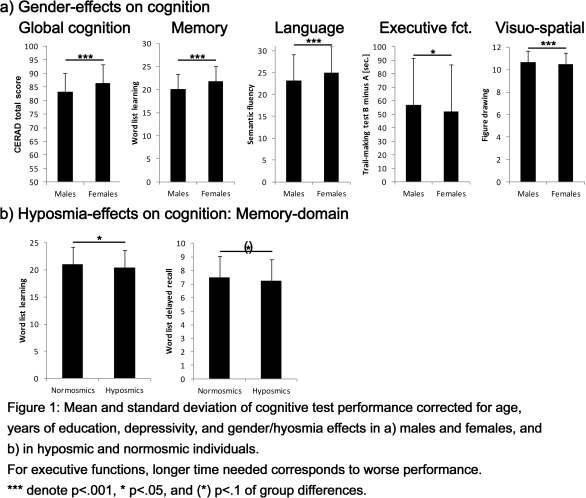Session Information
Date: Wednesday, June 22, 2016
Session Title: Parkinson's disease: Cognition
Session Time: 12:00pm-1:30pm
Location: Exhibit Hall located in Hall B, Level 2
Objective: To evaluate the impact of gender, age and hyposmia on the cognitive performance in memory, language, executive, and visuo-spatial functions to set the stage for prodromal marker analyses in Parkinson’s disease (PD).
Background: Increasing evidence suggest that non-motor symptoms, including cognitive and olfactory deficits, play an important role in PD as well as in its prodromal stage. To evaluate the specific predictive potential of prodromal markers influences of demographic factors need to be considered.
Methods: 1161 healthy elderly individuals (age: 64±7 years, mean±SD; range: 49-83y; 51.5% males) were investigated in cross-sectional analyses of cognitive performance (CERAD-Plus battery; first-time test performers). Hyposmia was assessed using Sniffin’ Sticks (<12/16 odors identified). Gender- and hyposmia-effects on cognitive performance were determined using ANCOVAs (covariates: age, years of education, Beck’s Depression Inventory (BDI-II) scores, and gender/hyposmia).
Results: Females (F) were significantly younger (-2.0y), less educated (-1.5y) and showed higher depressivity (+2.4 on the BDI-II score) and, while accounting for these differences, were characterized by better global cognitive performance than males (M; CERAD total score, MMSE, p<.001). Specifically, in memory (word list learning, delayed recall, p<.001), language (semantic fluency, p<.001), and executive functions (trail-making test B-A, p=.021), F performed better than M. However, M performed better in visuo-spatial functions (figure drawing, p<.001; Fig. 1a). Age was negatively correlated with the CERAD total score (r=-.35, p<.001; F/M). F (12.0±2.9 odors) showed better olfaction than M (11.3±2.9; p<.001). Hyposmia (17%) showed a specific impact on memory function (word list learning: p=.011; delayed recall: p=.062; Fig. 1b), but not on other cognitive domains (p>.1). Hyposmia-effects did not significantly differ between M and F. 
Conclusions: Demographic factors, such as gender, age and education have a highly relevant interdependency with prodromal PD factors, such as cognitive deficits, depressivity and hyposmia. Hyposmia may be a specific marker of early neurodegeneration in olfactory bulbus and hippocampal regions affecting only memory but no other cognitive domains. We therefore strongly recommend to consider these factors for future analyses of prodromal markers in PD.
To cite this abstract in AMA style:
S. Heinzel, U. Suenkel, F.G. Metzger, E. Schaeffer, B. Roeben, R. Yilmaz, S. Lerche, K. Brockmann, A.K. von Thaler, I. Liepelt-Scarfone, G.W. Eschweiler, A.J. Fallgatter, W. Maetzler, D. Berg. Effects of gender, age and hyposmia on cognitive functions in healthy elderly individuals at risk for Parkinson’s disease: Results from the TREND study [abstract]. Mov Disord. 2016; 31 (suppl 2). https://www.mdsabstracts.org/abstract/effects-of-gender-age-and-hyposmia-on-cognitive-functions-in-healthy-elderly-individuals-at-risk-for-parkinsons-disease-results-from-the-trend-study/. Accessed December 25, 2025.« Back to 2016 International Congress
MDS Abstracts - https://www.mdsabstracts.org/abstract/effects-of-gender-age-and-hyposmia-on-cognitive-functions-in-healthy-elderly-individuals-at-risk-for-parkinsons-disease-results-from-the-trend-study/
